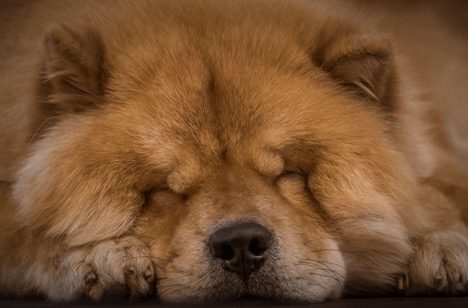In the vast world of dog breeds, few can match the majestic allure of the Chow Chow. With its distinctive appearance and endearing personality, this ancient breed from China has won the hearts of many dog lovers worldwide.
Beyond their striking lion-like mane and unique blue-black tongue lies a loyal and devoted companion.
This article delves into the reasons why the Chow Chow makes an exceptional pet, exploring their history, temperament, intelligence, health considerations, exercise needs, heartwarming stories of loyalty, and the profound impact they have on their owners' lives.
History and Origins of the Chow Chow
The Chow Chow's roots can be traced back over 2,000 years to ancient China, where they served as versatile working dogs. Revered for their hunting prowess, guarding abilities, and exceptional strength, they were prized possessions of nobles and royalty.
The Chow Chow's Original Purposes
Originally bred for hunting and tracking, they also excelled as guardians of temples and valuable possessions. Their strength and endurance made them ideal for pulling carts and assisting in various daily tasks. They are now classified as non-sporting dogs by the American Kennel Club (AKC).
Distinctive Physical Characteristics
The Chow Chow's double coat comes in two variations: smooth and rough. Their dense fur is available in a range of captivating colors, including red, black, blue, cinnamon, and cream. Regular grooming is essential to maintain their regal appearance and prevent matting.
Impressive Features
The Chow Chow's most iconic feature is its lion-like mane and thick ruff around the neck. Their small, triangular, and erect ears, coupled with their unique blue-black tongue, contribute to their captivating and regal presence.
Temperament and Personality
Beneath their majestic exterior, Chow Chows form deep and unbreakable bonds with their owners. Known for their unwavering loyalty and affection, they become true members of the family, fiercely protective of their loved ones.
Reserved with Strangers
Chow Chows tend to be aloof with unfamiliar people, making them excellent watchdogs. Early socialization is vital to promote positive interactions with strangers and prevent over-protectiveness.
Training for a Balanced Temperament
While highly intelligent, Chow Chows possess an independent streak, which may present challenges during training. Positive reinforcement, patience, and consistent training are essential to ensure a well-rounded and well-behaved pet.
Intelligence and Trainability
Chow Chows rank high in intelligence among dog breeds, displaying discerning and perceptive minds. Their problem-solving abilities and adaptability make them highly trainable for various tasks.
Training Chow Chows with Patience
Despite their intelligence, they may be stubborn at times, necessitating a gentle yet firm training approach. Positive reinforcement and rewards-based methods are highly effective in motivating them to learn and obey commands.
Exercise and Activity Requirements
Chow Chows have moderate exercise requirements, making them suitable for families with varying activity levels. Regular walks and playtime are essential for keeping them physically and mentally stimulated.
Fulfilling Their Working Instincts
Engaging Chow Chows in mental exercises, puzzles, and interactive toys taps into their working instincts, preventing boredom and fostering a healthy and contented pet.
Health Considerations
Like all breeds, Chow Chows are prone to specific health concerns, including hip dysplasia, elbow dysplasia, and entropion. Regular veterinary check-ups, proper nutrition, and a well-maintained exercise routine are essential for their overall well-being.
Responsible Breeding Practices
Choosing reputable breeders who prioritize health and genetic testing contributes to healthier Chow Chow puppies. For those looking to add a Chow Chow to their family, adoption from shelters or rescue organizations offers a responsible and compassionate option.
Chow Chow as a Family Pet
Chow Chows' inherent patience and gentle nature make them ideal companions for children. Proper supervision and education for both children and adults on interacting with dogs ensure a harmonious family environment.
Bonding with the Entire Household
Chow Chows adapt well to various family dynamics, forming deep connections with each member. Including them in family activities strengthens the bond and fosters a loving and caring relationship.
Chow Chow as a Guard Dog
The Chow Chow's keen awareness and protective instincts make them excellent watchdogs. They will alert their owners to potential threats, providing a sense of security and safety.
Socialization for a Balanced Guarding Behavior
Early socialization is essential to ensure their guarding tendencies remain controlled and non-aggressive. Training them to differentiate between friendly visitors and intruders fosters a well-adjusted and balanced temperament.
Heartwarming Chow Chow Stories
Real-life accounts of Chow Chows displaying extraordinary devotion and heroism. Their protective and caring nature often leads them to act as guardians and emotional support for their owners during difficult times.
Emotional Support and Comfort
Numerous heartwarming stories showcase Chow Chows providing emotional support and comfort to their human companions. Their unwavering presence often becomes a source of strength during life's challenges.
Conclusion
The Chow Chow dog is a remarkable breed that combines beauty, intelligence, loyalty, and protective instincts. Whether as a devoted family pet or a faithful guardian, the Chow Chow's unique qualities continue to charm dog enthusiasts worldwide.
Understanding their history, respecting their temperament, and providing the care they deserve will undoubtedly enrich the lives of those fortunate enough to share their journey. As the embodiment of the enduring bond between humans and canines, Chow Chows leave an indelible mark on the hearts of those who welcome them into their homes and hearts.
Owning a Chow Chow is a testament to the extraordinary and irreplaceable relationship between pets and their human companions.




